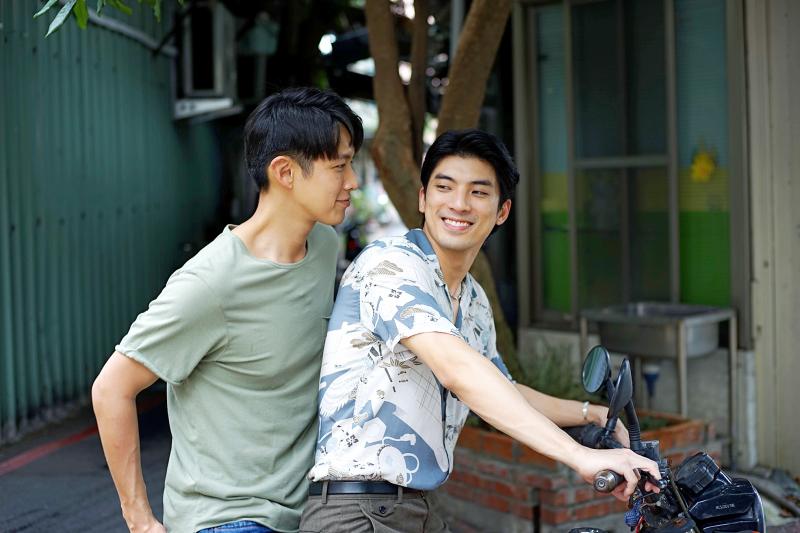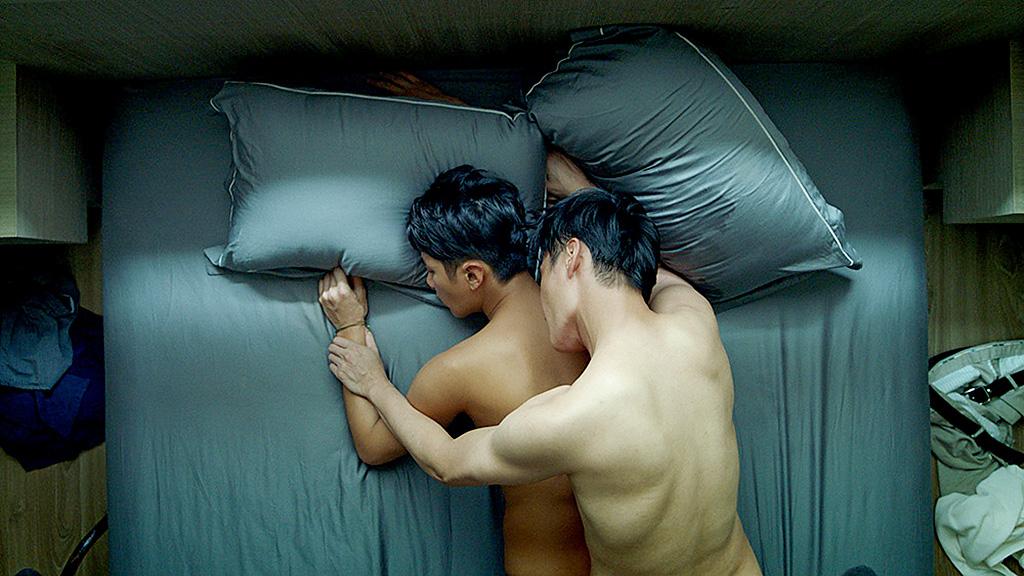Foreign viewers at the Cannes premiere of Moneyboys (金錢男孩) may not have noticed the glaring incongruities that persist through the movie, but Taiwanese viewers certainly will. They’re apparent to the point that it’s difficult to enjoy the movie.
First of all, the entire film is obviously shot in Taiwan, but the plot is set in fictional locales in southern China, with most secondary characters, passersby and television announcers speaking in Beijing-accented Mandarin.
This melancholy tale revolves around gay sex workers in China and the unique challenges they face, especially regarding traditional expectations, including marriage, and the large-scale rural-to-urban migration of young people. This is an interesting topic, as it’s taboo in China and significantly different from the LGBTQ situation in Taiwan. Shooting it in Taiwan was probably a way for this story to be told, as Chinese authorities do not welcome films depicting overt homosexuality. And it’s quite explicit in Moneyboys, especially the sex scenes.

Photo courtesy of Cola Films
Which brings us to the second problem. Given the tensions between Taipei and Beijing, it might raise a few eyebrows for Taiwanese to see their homeland portrayed as part of China. Politics aside, however, CB Yi, the Chinese-Austrian director who is using a pseudonym for fear of reprisals against relatives still living in China, has made some other questionable decisions.
Take language, for example. Despite his superb acting, which earned him a Golden Horse nomination, Taiwanese lead actor Kai Ko (柯震東) delivers his lines as A-fei in an unnatural Mandarin accent, while using vocabulary that’s more common in China. So does the other Taiwanese principal actor, JC Lin (林哲熹), who portrays A-fei’s former lover Xiao-lai.
This just scratches the surface of the linguistic trainwreck. At one point, A-fei returns to his home village, where everyone speaks Hoklo (also known as Taiwanese) — except for his father and childhood friend A-long (Bai Yufan, 白宇帆), both of whom inexplicably speak with strong Beijing accents and obviously cannot speak the local tongue. This is just sloppy, especially since A-long eventually takes on a significant role in the film.

Photo courtesy of Cola Films
Perhaps A-fei’s father moved to the village later in life, but it is simply not believable that two people of the same generation from the same village speak with radically different accents.
The city that A-fei lives in feels like Taiwan at one moment and China in another; one simply can’t just package one as another as the scenery and atmosphere in the two places are markedly different. It doesn’t take much to realize that the street scenes are in Taipei and Keelung, with landmarks that give the exact locations away. Adding Beijing-accented background chatter simply does not cut it. Yi has more control over the shiny indoor bars, traditional gardens and other interior scenes that feel very much like China.
All of this wouldn’t be a problem if the target audience was purely Western, especially when the highly stylized Eastern aesthetics and cinematography are amped up to accentuate the foreignness of the settings. But especially as a co-Taiwanese production, these issues should have been considered more carefully.
Anyhow, Ko should still be praised for his intense and heartfelt performance as a complex character who is torn between worlds. He toils in risky, illicit work to support his family back home, but they shun him due to the rumors of what he does. He starts a relationship with A-long, but cannot forget his former lover Xiao-lai, a gay man now married with children — a phenomenon in China that has gained much attention in recent years. Ko struggles between his work and his emotional needs, especially for romance, and seemingly engages in self-sabotage.
Bai also holds his own as the more idealistic, playful counterpart to Ko, and the two have great chemistry and pretty much carry the film.
Despite its bright color palette and bursts of energy, however, Moneyboys is more of a contemplative, drawn-out affair that dives deep into the psyche of a character stuck in a world that he struggles to thrive in. In a vacuum, it’s a decent effort that provides a narrow yet empathetic look at a subject seldom discussed in China. Still, the aforementioned distractions are too much to bear.

That US assistance was a model for Taiwan’s spectacular development success was early recognized by policymakers and analysts. In a report to the US Congress for the fiscal year 1962, former President John F. Kennedy noted Taiwan’s “rapid economic growth,” was “producing a substantial net gain in living.” Kennedy had a stake in Taiwan’s achievements and the US’ official development assistance (ODA) in general: In September 1961, his entreaty to make the 1960s a “decade of development,” and an accompanying proposal for dedicated legislation to this end, had been formalized by congressional passage of the Foreign Assistance Act. Two

Despite the intense sunshine, we were hardly breaking a sweat as we cruised along the flat, dedicated bike lane, well protected from the heat by a canopy of trees. The electric assist on the bikes likely made a difference, too. Far removed from the bustle and noise of the Taichung traffic, we admired the serene rural scenery, making our way over rivers, alongside rice paddies and through pear orchards. Our route for the day covered two bike paths that connect in Fengyuan District (豐原) and are best done together. The Hou-Feng Bike Path (后豐鐵馬道) runs southward from Houli District (后里) while the

On March 13 President William Lai (賴清德) gave a national security speech noting the 20th year since the passing of China’s Anti-Secession Law (反分裂國家法) in March 2005 that laid the legal groundwork for an invasion of Taiwan. That law, and other subsequent ones, are merely political theater created by the Chinese Communist Party (CCP) to have something to point to so they can claim “we have to do it, it is the law.” The president’s speech was somber and said: “By its actions, China already satisfies the definition of a ‘foreign hostile force’ as provided in the Anti-Infiltration Act, which unlike

Mirror mirror on the wall, what’s the fairest Disney live-action remake of them all? Wait, mirror. Hold on a second. Maybe choosing from the likes of Alice in Wonderland (2010), Mulan (2020) and The Lion King (2019) isn’t such a good idea. Mirror, on second thought, what’s on Netflix? Even the most devoted fans would have to acknowledge that these have not been the most illustrious illustrations of Disney magic. At their best (Pete’s Dragon? Cinderella?) they breathe life into old classics that could use a little updating. At their worst, well, blue Will Smith. Given the rapacious rate of remakes in modern